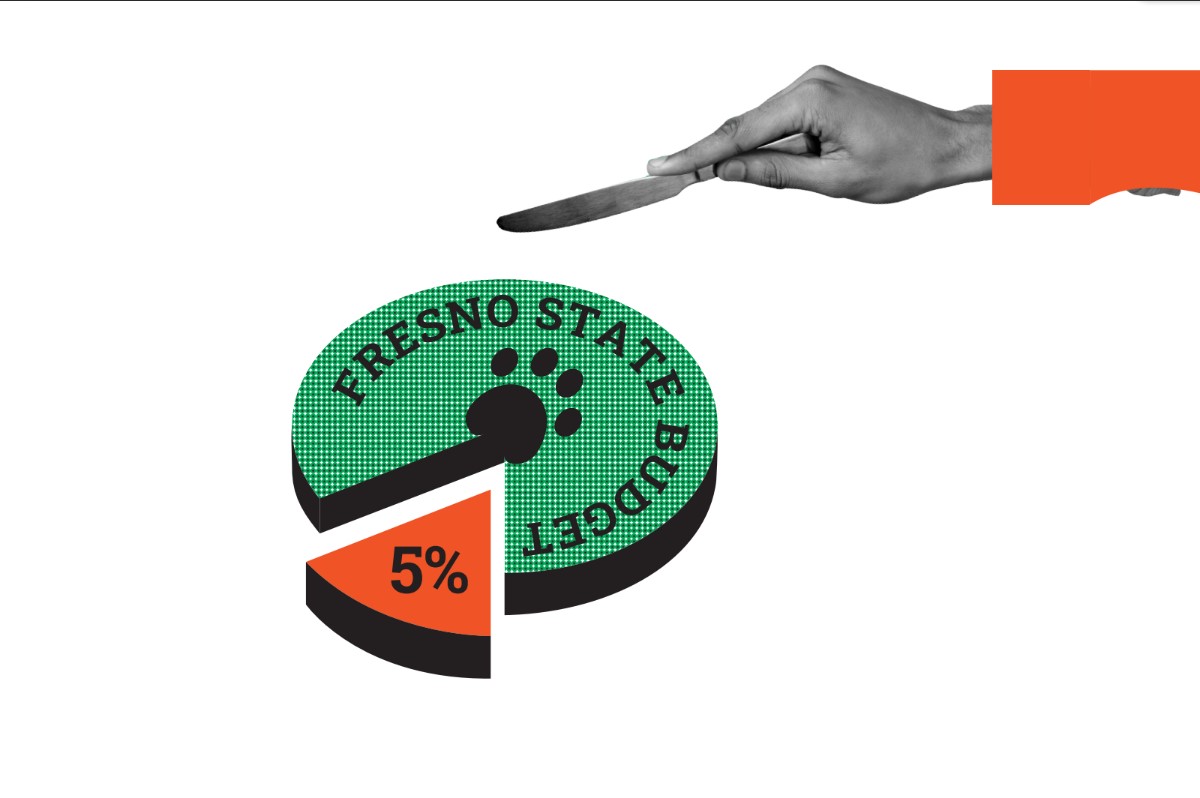For Ryan Camarena, a Fresno State junior, the cancellation of Graphic Design 157 detoured nearly his entire academic plan for his last two years.
His plan was to be full-time this year, and then part-time for his final year to minimize costs. However, that isn’t an option anymore since he’ll have to take the graphic design course next semester.
“I’ve fallen behind this semester trying to readjust my schedule to justify staying full-time this semester,” Camarena said.
Camarena is just one of the many individuals impacted by the 5% budget cuts announced at the start of the 2024-25 academic year.
The Fresno State aspect of the budget cuts
Fresno State is experiencing cuts in course numbers, fewer weighted teaching units (WTU) leading to less opportunities for adjunct faculty, and student job losses in the theater department.
Xuanning Fu, provost and vice president for Academic Affairs, talked about the bad news in a faculty-wide email in August.
“As you may have learned, this academic year the CSU system is experiencing a $218 million deficit, and our campus has undergone a 5% budget reduction across divisions,” he wrote. “Our share of the 5% is $6.17 million.”
The 5% cut is only the prelude to the California State University (CSU) system’s much larger anticipated budget cut of $1 billion for the 2025-26 year, Fu added.
The budget cuts are due to lower than expected tax revenues in California. Gov. Gavin Newsom announced budget cuts that are affecting the entire CSU.
CSU campuses system-wide are bracing for the impact of this budget cut, which is a sizable chunk of the CSU’s estimated expenditure of $12.6 billion each academic year.
Fresno State is being impacted the most by cuts in its course numbers, even though this semester the university counted 24,342 full-time enrollments (FTEs), including the largest cohort of new students, as of August.
“This fall, the total units offered are about 7% lower than last year,” Fu said in a statement to The Collegian.
Fall 2024 has seen an increase in both full-time enrollments and headcounts compared to Fall 2023, with the average unit load remaining steady at 12.9, he said.
In order to determine each department’s allocated budget for the year, each college dean and department chair worked together with the president to determine the best way to save money without compromising the students, according to Debbie Adishian-Astone, chief financial officer and vice president for administration.
“All department chairs in each college were tasked with reviewing their course schedules and identifying ways to meet resource-saving goals while ensuring student success and maintaining the integrity of their programs,” Fu said.
Faculty members losing out on workloads
The university cut 41 sections of English courses this semester. The budget cuts also reduced teaching units and faculty workloads.
“This is being achieved through the elimination of 800 WTUs for the fall (spread across all of the colleges), a reduction in operational expenditures, and a one-time carry forward,”said Andrew Jones, CFA Fresno chapter president.
Full-time faculty positions, however, have not been affected, administrators say.
“The reduction in sections did not result in faculty layoffs, as the English department has managed to reassign faculty and adjust workloads to accommodate changes in enrollment patterns,” Fu said.
However, the faculty union says the workload reductions still impose challenges on the staff.
“As far as I know, we have not had any layoffs of faculty and yet class sizes have been creeping up year to year as the administration looks to squeeze more work out of less and less faculty,” Jones said. “Chairs worked hard to prevent cuts to lecturers, but many lost sections – that’s not a full layoff but it’s not inconsequential.”
Faculty members have expressed discontent with the budget cuts, especially considering the CSU chancellor’s salary. The California Faculty Association (CFA) weighed in on the matter.
“Many of Fresno State’s staff are working second jobs to make ends meet, as pay raises have been few and far between,” Jones said. “Faculty and staff are angry about budget cuts that affect them as well as students. This is especially egregious, given the Chancellor is sitting on reserve funds from investments of over $8 billion.”
However, according to the CSU website, as of June 30, the CSU has approximately $2 billion in reserves, which can operate all 23 CSUs for 34 days. Reserve funds are untouched funds that serve for emergency situations.
The CFA believes that the reserves are being misused.
“For a number of years now, the Board of Trustees and the Chancellor have not allocated all of the money coming from the Legislature to the 23 campuses, but instead have taken a portion that should go for the operations and mission of the CSU and used it for investments,” Jones said in a statement to The Collegian. “From what I have observed, the Board and the Chancellor are treating this reserve like it is the stock for a corporation. They want to see it increase in value and not use it as the Legislature has mandated.”
Jiménez-Sandoval said that the university is being as transparent as possible regarding the school’s financial situation.
“Fresno State is committed to being transparent and making the best decisions we can during these budget challenges,” Jiménez-Sandoval said in a statement to The Collegian. “Our current budget situation is due to reductions in state funding, and thanks to the hard work and careful planning of our leadership team, with input from many across campus, we’ve managed to balance the budget without sacrificing our mission or laying off faculty or staff.”
Financial burden on students
The CFA is also expressing frustration because some of the financial burden may be placed on students.
“CSUs may impose additional fees on students to cover the budget cuts administrators are implementing (Sacramento State, for example, is imposing an additional $1,000 in fees on its students on top of the six percent imposed by the Board of Trustees), placing additional financial burdens on our students, in addition to less class offerings for fall,” Jones said.
Adishian-Astone confirmed that in order to cover some student co-curricular activities, student fee increases will be considered.
“While Fresno State has developed a balanced budget for FY 2024/25, there are more severe budget challenges coming in the next few years that may require consideration of student fee increases to support programs and initiatives that promote student success and expand co-curricular experiences,” Adishian-Astone told The Collegian.
Although student fees have not been increased, students are still being affected.
The theater department had to reduce its student assistant positions, cutting back on staff members that play an essential role in production.
“Our department relies heavily on student assistants for vital support in the scene, costume and lighting shops, as well as for box office operations and ushering during performances,” said Miguel Gastelum, communications specialist for the Department of Theatre and Dance.
This not only affects paid student positions, but also impacts student learning in a professional setting.
“This reduction not only hampers our operational capacity but also limits the career development opportunities we can offer,” Gastelum said. “These student positions provide valuable, hands-on experience, equipping them with practical skills that are essential as they transition into the professional workforce.”
When asked if the budget cuts would affect how often the campus was maintained, in terms of plant and tree care, and police and emergency services, Adishian-Astone said the budget required the prioritization of essential services.
“Our goal is to continue providing a safe and welcoming campus, and we will make every effort to sustain these services despite financial constraints,” Adishian-Astone said. “Public Safety’s annual budget was not reduced or negatively impacted by the Division of Administration and Finance’s 5% budget reduction plan.”
Canceled courses at the start of the semester
At the start of the semester, courses were consistently canceled with little to no notice to students.
Upon enrollment, the course professor would appear as To Be Announced (TBA), but the class would switch to canceled without any announcement of a professor.
For students to graduate in four years and complete the total of 120 units to receive a degree, it is recommended that students take 15 units each semester. In order to be considered a full-time student, only 12 units a semester are required.
However, due to the budget cuts, some students were unable to fulfill the 15 unit preference, which could result in taking up to 18 units or more for a semester to make up the missing units and still graduate in four years.
On Sept. 17, Shakina messaged The Collegian Instagram with complaints about a Chicano Latin American Studies class being canceled. She did not provide her last name.
“Around two weeks before the fall semester started, I got an email notifying me that my CLAS 130 class was canceled,” she said. “I needed this class to fulfill my degree requirement, and to have my preference of at least 15 units of classes per semester. Since then, I have not been able to find a new class to take its spot despite looking at My Fresno State almost every single day.”
Tuition increase and student enrollment
Students are also being affected because in September 2023, the CSU voted for and approved a five-year tuition increase that is expected to raise $840 million. However, the revenue it will generate is still not enough to cover the cuts.
“Even with the tuition increase, our campus only received additional funding from the CSU budget to support a portion of mandatory cost increases (benefits and insurance), Cal-NAGPRA and Title IX and some support for compensation increases,” Adishian-Astone said. “However, the campus had to cover 78% ($11.2 million) of the additional cost for well-deserved employee general salary increases, which neither the State nor the Chancellor’s Office funded.”
Cal Matters reported that the budget cuts could result in fewer enrollments each year, less employee raises and needing to spend more money to boost graduation rates.
According to the report, San Jose State has cut $55 million from its budget by not hiring new staff and not filling non-faculty job openings.
The campus is also increasing the number of non-resident student acceptances because they pay more in tuition. The acceptance rates are also gearing toward majors that aren’t overenrolled.
Fresno State’s enrollment rates will not be affected by the budget cuts, according to the administration.
At this point, Fresno State has passed the bulk of its necessary budget cuts and does not anticipate imposing anymore this year.
“I’m proud to share that, unlike some other CSU campuses, Fresno State does not anticipate further budget cuts this fiscal year,” Jiménez-Sandoval said. “My top priority is always to protect the services and support you receive as students, and to ensure our faculty and staff are recognized for their hard work—because they are essential to your success.”
However, Camarena, the student whose final years were entirely thrown off by the cancellation of his graphic design class, feels like Fresno State has let him down.
“I transferred to Fresno State in 2022 for some stability, but it feels like every year they give me reasons to stop trusting their ability to provide the education they promised me,” Camarena said. “I put in the time and money and so have [thousands] of others, it’s a shame knowing that [a] wide majority of students are accepted here, but will be inevitably be discarded if stuff like this continues.”
Correction: In a previous version of this story two quotes were misattributed. The story now reflects all the correct attributions. Xuanning Fu, is the provost and vice president of Academic Affairs.






